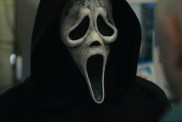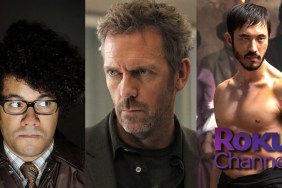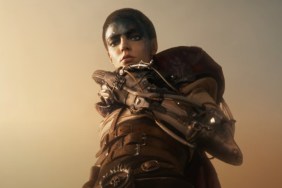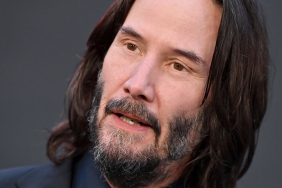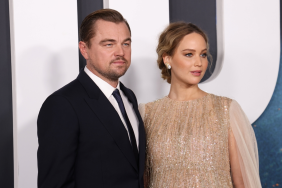Luc Besson might look like he’s on his last legs, but that’s only because he’s wobbling around on crutches since the last time ComingSoon.net talked to him about his animated feature Arthur and the Invisibles. This time, he’s joined by a rather stunning companion, one Rie Rasmussen, the Danish artist/model/filmmaker who stars in his new black-and-white French action-romance. Angel-A is about a loser (Amélie‘s Jamel Debbouze) who’s at his wit’s end until the beautiful Angela (played by Rie) literally falls into his life, purporting to be a guardian angel who wants to help him turn his luck around.
Besson was explaining to us how he injured himself after watching the results of the recent French presidential election (he was joking) and Rie returned in the middle of our discussion of French politics with the suggestion, “I think they should just elect Luc Besson, somebody who wants something good for the country,” to which Besson mused, “Maybe if I have nothing to do on Monday.” That quick-witted statement may be truer than Besson would like, as he remains one of the busiest filmmakers in Europe, working on various capacities on numerous films simultaneously.
Otherwise, that’s pretty much how things went when ComingSoon.net sat down with the duo to talk about their new movie, Besson playing the serious straight man and Rasmussen chiming in like an energetic combination of Greek chorus and a fan club, keeping things lively with a string of expletives that one might expect in a Quentin Tarantino interview. (Seriously, is there anything hotter than a gorgeous woman who cusses? I doubt it.)
ComingSoon.net: Luc, when I talked to you in January, you mentioned this movie as being your little French art film, but it’s far bigger than that, because it was shot all over Paris, and there’s a good amount of action. How long ago did you have the idea to make this movie?
Luc Besson: I started to write it like ten years ago, just the basic characters, and I knew where I wanted to go, and I had 15 to 20 pages, but it was very difficult for me to write the dialogue at the time, because I was too young. I knew what I wanted to say, but I couldn’t find the right words or to say one feeling, I would need 15 lines, which was way too much. So I put the thing on the side, and I have ten years of experience, and ten years later I start again on the same pages, and it came very fast in fact.
CS: This is probably one of your most dialogue-driven movies, so was this something that you just added to over the years or did you really just sit down and finish it.
Besson: No, it was straight. Most of the people when they talk about my films, it’s always about the vision and the frame and the color and the music and the sound, and I always feel a little frustrated, because what I want to say through the films are often more important for me than the shape. At least this one was clearer, because it was a man and a woman and they talk all day long.
Rie Rasmussen: But it’s also a movie about finding yourself and understanding yourself and respecting yourself. That’s the way to do it, is to get the inside of you out and expressing yourself. If you don’t communicate and express yourself, you’re never going to know who the f**k you are.
CS: Have you two known each other for along time and how did you end up starring as the woman that saves this poor soul?
Rasmussen: I think [we’ve known each other] for about three years now, but quite a long time. I met him three years when I brought my first feature film as a young aspiring and very eager director and writer to his company Europa, and they all smiled at me, patted me on the head and said, “Here, you can make a short film!” So I made a short film with this company, which was then nominated at the Cannes Film Festival, and Luc was like, “Ah, well, she kind of knows what she’s doing
maybe.” And then I did another short film and I was working on my feature film, and Luc came along and handed me this script. He goes, “Here, read it.” I read it and I loved it, and I think the endline of the film and the essential message about love and acceptance of you and others, and the political environment and social situation of the world right now, for me, was really fantastic and something I really wanted to partake in. Especially being Danish, a very politically correct country, I felt it was beautiful. I also think that involuntarily, he cast me and Jamel, a Western woman and a North African Arabic man, in a love story together, and if there’s anything I’d like to say is to unite your cultures with love ’cause we’re all the same. That’s totally down my alley.

CS: Was Rie your first choice to play Angela?
Besson: Yeah, both were the first choice. I was slow on the script because I couldn’t find the girl and I couldn’t find the guy, so I was just meeting [actors], and I knew that one day I would probably (maybe never) meet him or meet her.
Rasmussen: And you would be inspired to write it. Then once you were inspired, it took you like two weeks.
Besson: [After I met them] I went back to the script, because if you go back to the script and you have nobody to play it, then what’s the point? I’d rather write something else.
Rasmussen: He can’t visualize it.
Besson: But I met her and I met him, so I said okay let’s go back to it. I didn’t say anything to them. I did that in a sneaky way.
CS: Did you have a chance to spend any time with the two of them to see if they would work well together?
Besson: No.
Rasmussen: He’s good at motherf**king casting is all I can say. He has a little bit of experience.
Besson: They met when they were both signed, and they knew they were going to play the parts. I was going to wait until she had the right color of hair and the right dress, and the first time he met her was when we did the light test.
Rasmussen: Actually, it was at some script reading at a hotel, and I wore the hair and dress.
Besson: I was a little scared that Jamel wouldn’t be able to see from the script where we were going to go, and how she was going to play it. If she comes in with a ponytail like how she normally is, I was scared he won’t make the connection between the character and her. She accepted to present herself more like the character first, so we waited until her hair was the right color. She was kind of enough that the first time she met him, to be more “Angela” than herself, because I wanted him to be impressed and to say, “Oh My God!” Then he buys it.
Rasmussen: You always have to manipulate the man.
CS: What did he tell you about Angela to inform you how to play her? Was it all in the script or did he give you any specific direction?
Rasmussen: Luc’s a very quiet man. He doesn’t speak about things he hasn’t done. Once he’s done them, he’ll say “here” and then he’ll walk out of the room. He knows how much I love scripts and movies and hanging around, trying to see anything, and he handed me the script and goes, “Here, read this.” I was destroyed. It was beautiful, the arc of the characters and the development. I could see it. I didn’t know anything except to read the script. By then, Luc was a person I’d known and had participated in building a strong and a very prominent character and therefore, by the time we got to the shooting schedule, we had worked out this Angela person together. There was this extreme gratefulness that I was able to collaborate with him to this extent. Then you could easily put yourself as a fragile egg in his hand and let him take it from there ’cause it’s motherf**kin’ Luc Besson. You let him carry you, and it’s a beautiful experience, because Luc Besson, contrary to other directors working now, has done every job on the set. He’s been third, first, second assistant and the gaffer and grip and cupholder and coffee-getter, so you can feel the immense respect of the crew. They all know that he knows what they’re doing and that he can do it better than then, so therefore, do your motherf**kin’ job! (laughs) That’s why the experience was really enriching. I think as a filmmaker, I was shaped by Luc Besson when I saw “The Big Blue” and when I saw “La Femme Nikita” and “Leon.”
CS: Being familiar with his films, you must have known what type of female characters he likes in his movie, which must have helped the process.
Rasmussen: I think all of his characters, but I think that Luc was the one person that brought equality to films, who brought females up to the male’s level. We notice the females so much more, so we think that they’re beyond the males, but she’s not, she’s just equal, and that’s very disturbing for very many filmgoers, because we haven’t really seen that yet.
CS: That said, women might perceive this as a male fantasy where the sad sack loser has this beautiful girl whose way out of his league fall into his lap and changes his life. Do you think women might see Angela as an empowering character or just another male take on the perfect female?
Rasmussen: Honestly, everybody has responded to it with a sigh of “It’s so sweet and nice and it’s love.” First of all, you have to realize that females fall in love in a different structure than men. Often, it’s not exterior, but secondly, what he’s saying is “I want to bring the female to the level where she should be.” It’s not about the exterior beauty of this girl, it’s about the superiority of the woman as a goddess and an angel, and that’s where she’s being put. I think Luc was being very careful with structuring this character visibly with what she’s wearing and her hair to not just be a hot girl but to be a timeless idea of beauty. Therefore, the woman seems like a goddess and an angel and she’s not just some hot woman that some guy gets to f**k. That’s not at all the point. The point is to bring them together in the yin and yang shape, and for men to remember that your woman could be an angel and a goddess and you’re not going to lose anything, but she’s going to give you wings to fly if you treat her well.
Besson: What I really like is this notion of saying to a man, “You’re a tiny introverted Moroccan guy from outside, but inside, you’re a hot 6′ blonde extroverted girl.”

CS: Luc, anyone watching the movie would assume that Andre is a part of yourself. Was there something in your own life that influenced this story?
Besson: Yes, the scene with the mirror happened to me. A girlfriend of mine, a long time ago, she pushed me to watch myself and to say that, and I was not able to do it. I think any man between 20 and 50 at a certain point has to accept that one day or another, and everybody who resists
you know what the most amazing thing for me when I watched the film with an audience? How people are uncomfortable and silent during the scene. A friend of mine said “I couldn’t watch the scene.” He was like this [covers his eyes] because he could not watch it. It’s so naked. It’s just a simple man like everyone in front of himself, just watching himself, and basically saying the simplest line on earth. At that moment, you have to deal with yourself and say, “I’m maybe not the best, but I’m not the worst. I am who I am. Hi, how are you?”
Rasmussen: Accepting yourself with the flaws you have makes it easier to accept society with its flaws or your neighbor, but really accepting yourself for things you’ve done that you might not agree with is very f**king difficult.
Besson: There’s this famous line that I’ve heard since I was like 20 years old, probably from Freud, “You can’t love the others if you don’t love yourself.” I’ve heard this line when I was like 19, and I couldn’t understand it for like 10 years. What does it mean? Then after a while, you realize it’s true. You realize you have to face yourself in the mirror, and maybe not love yourself, but at least like yourself, to accept yourself, and then if you accept yourself, then you can accept others.
CS: How much rehearsal did you have with Jamel once you were both on board?
Rasmussen: A lot. A lot. We rehearse, rehearse, rehearse, practice practice, so once we got on set, Luc, me and Jamel were TIGHT. We had our little crew and we could do whatever scene wherever at the drop of a hat. We knew all the dialogue from beginning to end, and Luc would just grab a handheld camera and just get right in our faces or move around, bring in some Steadicams, then we’d move location. It really was guerilla warfare filmmaking. (laughs)
Besson: With this type of dialogue, you need the ping-pong, so if you don’t know your line by heart, especially her who didn’t speak French before, she won’t be able to improvise anything, so he needs to know his lines by heart and she needs to know her lines by heart. I pushed them to rehearse and rehearse and rehearse, not so much about the expression and how to say it, but in terms of the text, to get rid of the text because you know it so much. I said to them that they’ll be ready when at any time, even during a dinner, if I say a line, and they’d be able to continue that line, both of them. They got to this point where they’d be laughing about a joke and I’d say a line, and I’d bring them straight back to their lines and they were able to do it.
Rasmussen: It was brilliant, it was amazing! It’s all about rehearsal, and it’s so funny when actors say “Oh, I improvised that thing.” There ain’t no motherf**kin’ improvising unless you know your lines by heart. Then you can start playing, but you gotta like have it down.
CS: Can you talk about shooting in Paris? Did you always envision where you wanted certain scenes to take place or was it a matter of going out and finding locations and shooting things?
Besson: I’m always careful when you have a script not to be locked by your ideas. A script is a script. It’s a paper with words, and you need to make it work on paper first, and then you change the state, you go from paper to film, and then you start to location scout and you have to go everywhere. For example, the bridges, I sent someone to each bridge in Paris every hour to take four picturesnorth, south, east, westin the middle of the bridge, and then we put those in a big, big book, so any bridges at any time, I can see how the light is reacting on stones and how it’s reflecting on the water or not. So with the DP, it was very easy to say, “This is the perfect hour and the perfect bridge for Scene #12.” After that, it was easy to arrive on the bridge at the right time, an hour before, and then you shoot for two hours and then we go.
CS: How were you able to shoot so much without having tons of tourists and people in every shot? They really seem like the only two people in Paris.
Besson: We never moved anyone. We just shot in July when the Parisians are on holidays and the tourists are sleeping. When we have a specific scene like on Alexander the 3rd Bridge, most of the time we did it on a Saturday or Sunday morning and there’s nobody. Okay, to be honest and take it as a joke and not being pretentious, but when Spielberg comes to make a film in Universal Studios, basically he comes to the studio and they’re like “Mr. Spielberg, what do you want? No problem.” When I make a film in Paris, this is my studio. So I say, “I want to have this bridge” and they’re like, “Okay, Mr. Besson, no problem.”

Rasmussen: Yeah, that works out, but he’s been putting work into the city for thirty years and making a lot of money for them there.
Besson: You know I worked on this film for the Olympic Games for Paris two years ago, so I met the mayor and I met all those guys. All together, we made a great job for the Olympic Games, so I know them and it’s easier.
CS: When I talked to you in January, you didn’t seem too eager to direct anymore. At the time, you said you were tired, so are you excited about directing again?
Besson: No, no, the same.
CS: But you’re involved in a couple other projects now, aren’t you?
Rasmussen: You know Europa, right? They never stop.
Besson: Well, this summer I’m going to shoot “Arthur 2” and “3” because it was a disaster here, but the film worked a lot around the world. It made more than $100 million box office without U.S., and the film was really well received all around. Unfortunately, here it didn’t work but it’s the only version of the film that’s not the same as the rest of the world. The distributor cut the film in every sense and made it nonsense, so I’m going to work on those movies for sure, so that’s one thing. There’s a couple films we’re shooting right now, and another animated film we started. It’s true that on the side that little bit by little bit, I get more involved in social programming in France and the environment. I want to use my position and influence to try to do good things.
CS: Is that what this project “Boomerang” is about, some kind of environmental doc?
Rasmussen: Yeah, “The Boomerang” is not the good title. The title is “Home.” You know Yann Arthus-Bertrand, the guy who takes pictures from the sky around the world? For like many years, he takes pictures from a helicopter everywhere in the world. It is brilliant. So basically we’re going to make a film about the environment and how things are linked. Somebody does that and
Rasmussen: The butterfly effect.
Besson: Yeah, the butterfly effect. He’s in Brazil right now filming. He’s going to do like 35 different spots around the world. I hope he will call me sometime.
Rasmussen: When you see the attitude of the projects that Europa producers without other production companies, it’s really, really impressive what goes through those offices on a daily basis. It’s really impressive the amount of sleep Luc gets, because it’s close to zero (laughs) and how hands on he is, because I hang in the offices all the time for inspiration and collaboration with other talents. It is really like a buzzing beehive over there.
Besson: She’s going to shoot in the fall.
CS: Doing your first feature? What’s that about?
Rasmussen: It’s set in the ex-Yugoslavia, kind of a comment on the border system in the world and how much benefit we get out of it and how maybe we don’t benefit from it, such as blood, death, terror and relentless wars. It’s a love story that kind of takes us through the universal injustice of borders, and I am definitely acting in it.
CS: Do you two have plans to do another movie together?
Rasmussen: We are already doing another movie together ’cause he’s going to produce it. (laughs) Hell, yeah!
CS: As far as going back and making more “Arthur” movies, one assumes that this time you won’t worry so much about the American market so that it would be released here in French with subtitles?
Besson: No, it’s not so much that. I was very happy about the results around the world, because I worked with 14 different studios around the world and they did a great job, but the distributor in the U.S. is the worst distributor I’ve ever worked with in my life. I have never seen someone with so much incompetence.
CS: I guess I should keep that off the record?
Besson: I don’t care. There’s no secret. If you work with incompetent people then the results are bad. They hid me since the beginning and they wanted to pretend the film was American. They reshot everything and they changed the music, and I watched the ads in the newspaper and I see the little girl of my film with blue hair and stockings.

CS: That reminds me a bit of when they dubbed Roberto Benigni’s “Pinocchio” with silly voices and dialogue in hopes of selling it to American kids over the holidays.
Besson: And you know what? Critics in America are not stupid. They don’t buy it because this is not an American film, so why try to make it look like an American film, and then they think it’s me who wants it to look like an American film, and then they’re mad at me, you know? It’s not me. It’s this man who is just lost. I have a lot of friends in the movie business here, ’cause I really appreciate the American cinema and I’m so happy to be with Sony because at least you can feel the difference. There’s a film and they respect the film, and I work with Fox a lot. You feel respect and you feel that you’re sharing the thing.
Rasmussen: They know you can produce a movie for a minimum amount and turn it out, get a cult audience and put people in the seats and make money for them. They have a respect for you because you’ve done it over and over and consistently. You have never been a bad business partner in your dealings with them, and that kind of consistency and loyalty is rare.
Besson: It’s happened twice in my life. “The Big Blue” was the same. The film was very successful around the world and the film arrived in the U.S. and it was the first film that Jerry Weintraub distributed. They recut the film, changed the music, and if you watch the trailer, it looks like Aquaman basically, and the film flopped. The funny thing is that 20 years later, they released the uncut version in the U.S. like two or three years ago, and the uncut version in just a couple cinema made more money than the original 20 years ago. It’s also to take the American audiences for stupid, and that’s what I hate. [does impression of Hollywood executive] “Oh, they don’t like subtitles. We know what they want, they want this and that.” I mean, c’mon. In France, in Paris today, you can see 50 different films from 50 different countries in the same day. From Iran to U.S. to Serbia to Holland, Japan, anywhere and you know what? You’re not obliged to go, but it’s here.
Angel-A opens in New York and Los Angeles on Friday, May 25. Check back later this week for a few exclusive clips.

